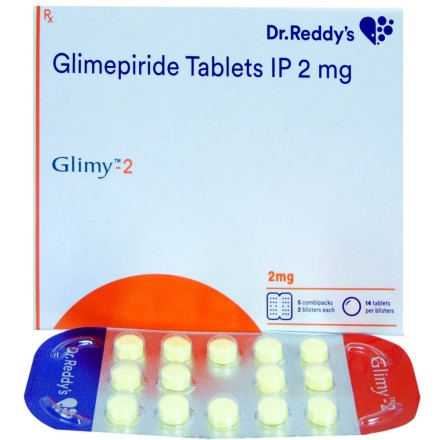-
Trueride 2mg Tablet (Rs.60.79)
Composition: Glimepiride (2mg)
-
Twipride 2 Tablet (Rs.57.19)
Composition: Glimepiride (2mg)
-
Truepride 2mg Tablet (Rs.59.06)
Composition: Glimepiride (2mg)
-
Sergipride 2mg Tablet (Rs.49.69)
Composition: Glimepiride (2mg)
-
Prymia 2mg Tablet (Rs.42.19)
Composition: Glimepiride (2mg)
-
Ojapride 2mg Tablet (Rs.56.79)
Composition: Glimepiride (2mg)
-
Ohaday 2mg Tablet (Rs.29.91)
Composition: Glimepiride (2mg)
-
Mypribet 2mg Tablet (Rs.53.65)
Composition: Glimepiride (2mg)
-
Orglimp 2mg Tablet (Rs.46.41)
Composition: Glimepiride (2mg)
-
Olglimide 2mg Tablet (Rs.30.17)
Composition: Glimepiride (2mg)
All Details About Glimy 2 Tablet
Find out detailed description, uses, directions of use, side effects, warnings and precautions, frequently asked questions about Glimy 2 Tablet
Description:
Glimy 2 Tablet belongs to a group of medicines called sulfonylureas and is used to treat type 2 diabetes mellitus in adults. It helps control blood sugar levels in people with diabetes thereby preventing serious complications of diabetes such as kidney damage and blindness.Glimy 2 Tablet may be used alone or along with other medicines. It should be taken just before or with the first meal of the day. Take it regularly at the same time each day to get the maximum benefit. Your doctor will decide what dose is best for you and this may change from time to time according to your blood sugar levels.
Retain taking Glimy 2 Tablet, even if you feel well or your blood sugar levels are controlled. If you stop it without consulting your doctor, your blood sugar levels could rise to put you at risk of diabetes complications such as kidney damage, blindness, nerve problems, and loss of limbs. Remember that it is only part of a treatment program that should also include a healthy diet, regular exercise, and weight reduction as advised by your doctor. Your lifestyle plays a big part in controlling diabetes.
The most common side effects of taking Glimy 2 Tablet include low blood sugar levels (hypoglycemia), nausea, headache, weakness, and dizziness. Make sure you recognize the signs of having low blood sugar levels, such as sweating, dizziness, headache, and shaking, and know how to deal with them. To prevent this, it is important to have regular meals and always carry a fast-acting source of glucose such as sugary food or fruit juice with you. Drinking alcohol can also increase your risk of low blood sugar levels and hence should be avoided. Some people may experience an increase in weight with this medicine.
You should not take Glimy 2 Tablet if you have type 1 diabetes mellitus, diabetic ketoacidosis (high levels of acid in your blood), or if you have severe kidney or liver disease. Earlier taking this medicine, tell your doctor if you have ever had heart disease, thyroid disease, or some hormonal conditions, as it may not be suitable. Pregnant or breastfeeding women should also consult their doctor before taking it. Your blood sugar levels should be checked regularly and your doctor may also advise blood tests to monitor your blood cell counts and liver function.
Uses:
Directions For Use:
Take this medicine in the dose and duration as advised by your doctor. Swallow it as a whole. Do not chew, crush or break it. Glimy 2 Tablet should be taken with or after food.Side Effects:
Most side effects do not require any medical attention and disappear as your body adjusts to the medicine. Consult your doctor if they persist or if you’re worried about themOrdinary side effects of Glimy
- Hypoglycemia (low blood glucose level)
- Headache
- Nausea
- Dizziness
- Weakness
Warning & Precautions:
Monitoring of the breastfed infant's blood glucose is advisable during maternal therapy with Glimy 2 Tablet
Employ of Glimy 2 Tablet is not recommended in patients with severe kidney disease. These patients can experience very low blood sugar levels which may become normal after a long time.
However, the use of Glimy 2 Tablet is not recommended in patients with severe liver disease. These patients can experience very low blood sugar levels which may become normal after a long time.
FAQs:
What is the dosage of Glimy 2 Tablet?
Does Glimy 2 Tablet make you sleepy?
Is Glimy 2 Tablet safe for kidneys?
Does Glimy 2 Tablet cause memory loss?
Who should not take Glimy 2 Tablet?
How long does it take for Glimy 2 Tablet to start working?
How long do I need to take Glimy 2 Tablet? Can I stop the medication?
What can happen if I take more than the recommended dose of Glimy 2 Tablet?
Can you take Glimy 2 Tablet on an empty stomach?
Can Glimy 2 Tablet cause weight gain?
Can Glimy 2 Tablet cause dizziness?
What should you not eat while taking Glimy 2 Tablet?
Is Glimy 2 Tablet safe to use?
Can people with diabetes have proteins?
Are artificial sweeteners good for people with diabetes?
Can diabetes cause kidney failure?
Can diabetes be cured?
Written by:
Dr. Lokanish
M.B.B.S.
Reviewed by:
Dr. Sureshbabu Yadav
M.B.B.S., DIP.DIAB, F.R.S.H
Disclaimer:
Getomeds primary intention is to ensure that its consumers get information that is reviewed by experts, accurate, and trustworthy. The information and contents of this website are for informational purposes only. They are not intended to be a substitute for professional medical advice, diagnosis, or treatment. Please seek the advice of your doctor and discuss all of your concerns about any disease or medication. Do not disregard or postpone seeking professional medical advice because of something you read on Getomeds. Our mission is to support, not replace, the doctor-patient relationship.
